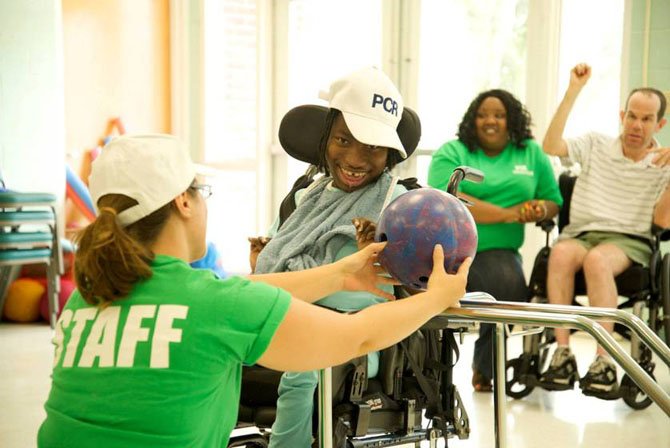Alyssa Florwick, deputy respite director for Potomac Community Resources, with a PCR member. Photo Contributed
Potomac — In 1994, Joan and Jim Sullivan of Potomac proposed an idea to Father John Enzler and the parishioners of Our Lady of Mercy Catholic Church — an idea that changed and improved services for teens and adults with developmental disabilities in Montgomery County.
Because their daughter Patricia was born with profound disabilities, they requested that the church do more to help people like their daughter. Patricia died on New Year’s Eve in 1994 without being able to participate in Potomac Community Resources’ programs.
“It goes to show how a serendipitous interaction can become very special and meaningful in a community,” said Stephen Riley, PCR’s executive director. “Our answer was to develop a series of innovative social, recreational programs and therapeutic programs. At our initial organizational meetings, we identified teens and adults as the people who most needed programs because there was little offered. PCR was created and now offers 35 semester programs as well as special events, information, advocacy and respite care.”
Participants in PCR are called members — and membership is free. Courses focus on communication skills and speech therapy, art and music instruction and fitness and exercise. All the exercise programs are led by a licensed personal trainer, music and art programs by licensed music and art therapists, and women’s and men’s groups are facilitated by licensed clinical social workers. Members enjoy participating in chorus, basketball, aerobics, yoga, rhythmic movement, photography classes — and in 5K running and walking programs. PCR also offers a Friday night social club as well as a series on transitioning from high school to adulthood. There is a minimal charge for the classes, but “no one is ever turned away or excluded,” said Abby Lubran, volunteer and program coordinator.
The Tricia Sullivan Respite Program is also offered for people with significant care needs and/or those with medical needs. This program provides five hours of therapeutically fun activities such as pet therapy, massages, sensory activities, wheelchair dancing, adaptive aerobics and aromatherapy. “The energy in the room is infectious,” said Lubran. “This program provides crucial social and recreational opportunities that they so need. Most live at home without a lot to do — and this gives them an opportunity for five hours once a month to come and have fun.”
Four times a year PCR holds special event parties for members, families, volunteers and staff — often attended by as many as 400. They host Halloween and Holiday parties at the Connelly School of the Holy Child, a February Beach Party where everyone shows up in colorful bathing suits, shorts — and even hula skirts and a July Barbeque at Smokey Glen. The Best Buddies program at Holy Child works in conjunction with PCR.
“We still operate from the same tiny office in the Parish House, donated by Our Lady of Mercy Church,” said Lubran. “Our program director, Seth Duncan, supervises our staff and personally knows each of the members and families. It’s a real culture of caring and understanding. We provide assistance in accessing available resources and services and also help families to advocate for their loved one. ”
Since PCR wants to maintain their size and programs in order to be personally involved with each member, they have been assisting other groups to launch their own programs for those with developmental disabilities. Riley said, “We have been advising other groups on how to do what they want to do by explaining how we work — and aiding them in any way we can. We are pleased because the number of available programs in and around Montgomery County has grown.”
PCR has won numerous awards for their innovative programs, including the Maryland Respite Care Coalition Outstanding Respite Care Provider Organization Award, the Arc of Montgomery County Community Service Award, the Catalogue for Philanthropy for Excellent Governance and Stewardship, the County Executive of Montgomery County Certificate of Recognition and Appreciation and the Maryland Recreation and Parks Association Innovative Program Award. They were just recently chosen to receive funding through the Combined Federal Campaign and the United Way of the National Capital Area.
PCR is funded by individual and corporate contributions, foundation grants and funding from the Montgomery County Department of Health and Human Services as well as through a grant from the Montgomery County Council. They are also supported by 100 or more volunteers each year. To become a member, to volunteer or to donate, visit www.pcr.inc.org or call 301-365-0561.
